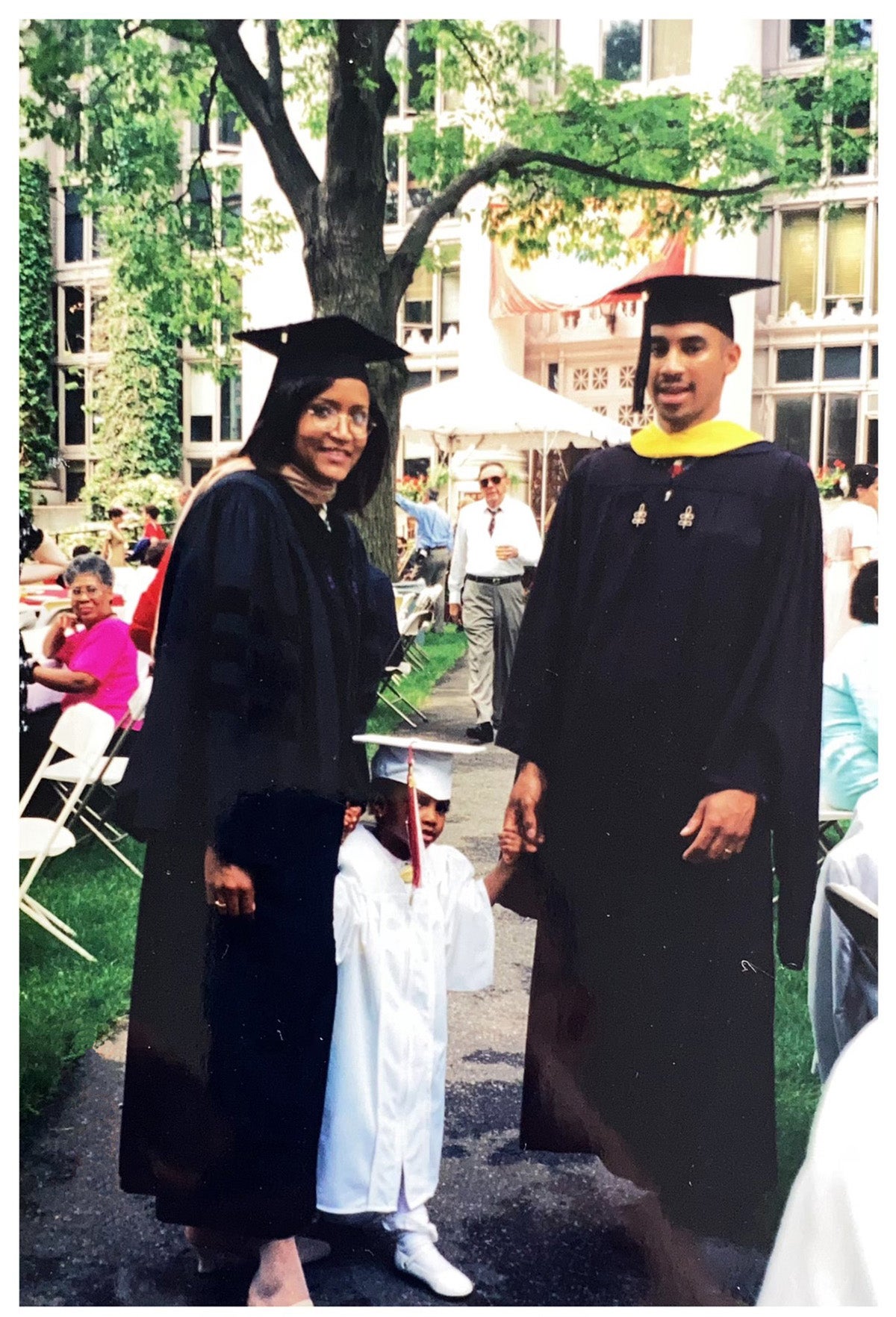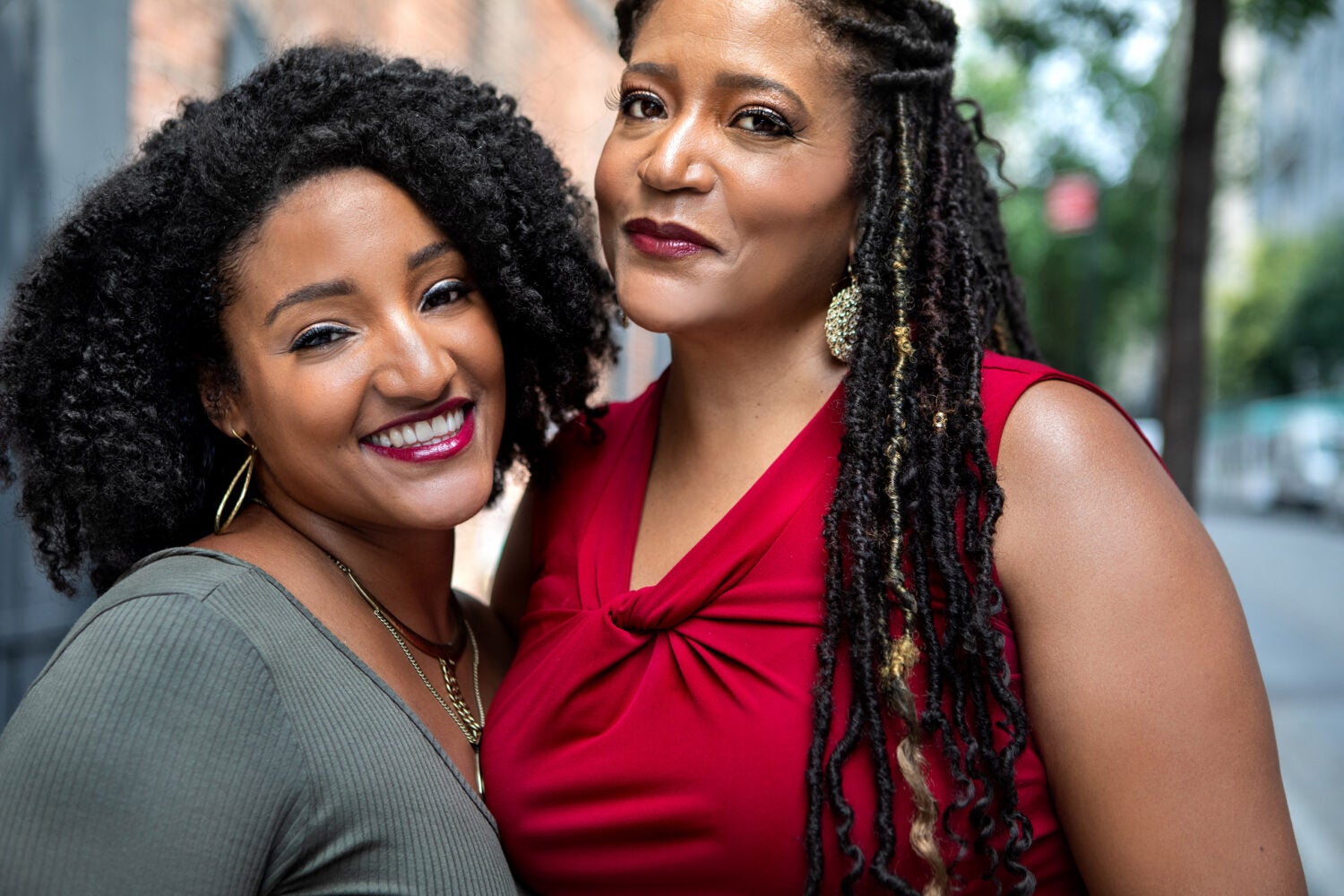Not long after Debbie Dickinson ’95 turned 51, she experienced her first hot flashes, the uncomfortable and sometimes intense flushing that accompanies menopause for many people. But when Dickinson looked for products that could offer her comfort, she was stunned to find that her options were limited — and rudimentary.
“This is a season of life for which we are not well-prepared in our society,” says Dickinson. “But it’s something that half the population will experience. And I was determined to find solutions.”
Dickinson’s quest to find relief for herself and others led her and her daughter, Markea Dickinson-Frasier, to develop Thermaband, a sleek wearable device expected to assist its first customers this Fall. The Thermaband Zone™, which can sense changes in body heat and automatically deliver a soothing sensation of cold or warmth, was also recently named runner-up in the Harvard Alumni Entrepreneurs global startup accelerator program.
‘Where is the 21st century version of wearing frozen pearls?’
Dickinson, who practiced employee benefits law after graduating from Harvard Law School and has also lectured at the University of Pennsylvania Wharton School, says she was surprised — and dismayed — when she first realized that little information and few products existed for those experiencing menopause.
“There’s a sunrise and sunset of the reproductive years. I was prepared for puberty. I was not prepared for menopause,” she says. “I wondered, ‘Why do I feel the way I feel? Is it normal? Why aren’t women generally prepared for this? How can we democratize information about menopause — and how can we create natural solutions using technology?’”
In her research, Dickinson learned how other women dealt with hot flashes, methods that included cradling a glass of ice water, gel packs, wearable fans, and cooling sprays. But she says she continued to feel frustration at the lack of modern solutions for the troublesome phenomena.
“Many of the solutions were low tech and antiquated,” she says. “I wondered, ‘Why can’t we leverage technology and science to provide relief and digital insights? Where is the 21st century version of wearing frozen pearls?’”
Dickinson began dreaming of something that resembled a Fitbit, a wearable device that instead of tracking steps would deliver the cooling she desired on demand. With this idea in mind, Dickinson says she wanted a partner to help develop the product and bring it to the market. Luckily, she knew just the right person: her daughter, who had previously completed a degree in supply chain management at Penn State before attending Yale University for her M.B.A.
“I did a rotational management program at Unilever, where I learned a lot about planning, manufacturing and how all of these processes fit together,” says Dickinson-Frasier. “I knew that I also wanted to pursue entrepreneurship, but needed the ‘right idea.’ This partnership was a really great opportunity to leverage my supply chain and marketing skills. It works well because Debbie is the creative one, and I think in terms of execution and how we will actually get this done.”
Dickinson, who gave birth to her daughter during law school — Dickinson-Frasier even accompanied her mother across Harvard Law’s commencement stage — describes their partnership as “serendipity.”
“We both have a passion for the underserved, for women, for making a difference,” says Dickinson. “Reaching out to her, and her instantly understanding that I was suffering, and also seeing the benefit to women of her generation of something like this, along with her supply chain background — it seemed like a perfect fit.”

The pair’s first move was to create a supportive online community where women could discuss their experiences and needs around these issues. “There were few safe spaces to communicate about this,” says Dickinson. “We built a community — a robust, multi-generational, 60,000 and growing, sisterhood on health, wellness, and menopause — so that women could connect and share ideas with one another.”
Then, the mother-daughter team brought in scientists, engineers, and menopausal experts to work on Dickinson’s idea. Their collaboration resulted in the Thermaband Zone™, which is worn on the wrist and is connected to an app that monitors the wearer’s body temperature. When the band senses a hot flash, it leaps into action.
“Thermaband grew from my own desperation to find a solution. I was not alone. Like many women, I wanted something portable, discreet, and activated on demand in a safe and effective way,” says Dickinson.
I’m a firm believer that if you follow your heart and your passion and do the things that you’re really interested in doing, you have a great chance of success. And any of the skills you don’t yet have, your passion will help attract the people and the resources you need to do what it is that will fulfill you.
Debbie Dickinson
She credits her legal training and business background with setting her up for success in entrepreneurship. Equally important, she adds, is a willingness to take risks. “I’m a firm believer that if you follow your heart and your passion and do the things that you’re really interested in doing, you have a great chance of success,” she says. “And any of the skills you don’t yet have, your passion will help attract the people and the resources you need to do what it is that will fulfill you.”
In addition to women experiencing menopause, Dickinson says that people with other conditions or treatments that cause thermal dysregulation — like anxiety and chemotherapy — may find Thermaband useful, too. And the product’s benefits are twofold. “In addition to instant relief, the app provides insight into what is happening with my body, such as what my heart rate is, for example,” she says. “This gives me information and data about my body so that I can better manage my own care. I can see triggers and correlations, and I can share this information with my clinician.”
This past summer, Dickinson and her daughter participated in the Harvard Alumni Entrepreneurs Accelerator, sponsored by Pegasus Tech Ventures. The program, a ten-week incubator for early-stage, alumni-founded companies, offered “lots of different competencies, and brought in several advisors and subject matter experts who were incredibly helpful,” says Dickinson. “It was a wonderful experience.”
Today, the first editions of the Zone are nearly ready to ship out to customers across the country, she says. Dickinson and Dickinson-Frasier plan to continue ongoing studies on the Zone, and say they are excited to participate in Harvard’s Launch Lab X GEO program, for which they were recently selected. Looking to the future, the team, which is backed by Google and other investors, hopes to attract additional investment in their product, expand its reach, and bring much-needed relief to women experiencing the side effects of menopause.
